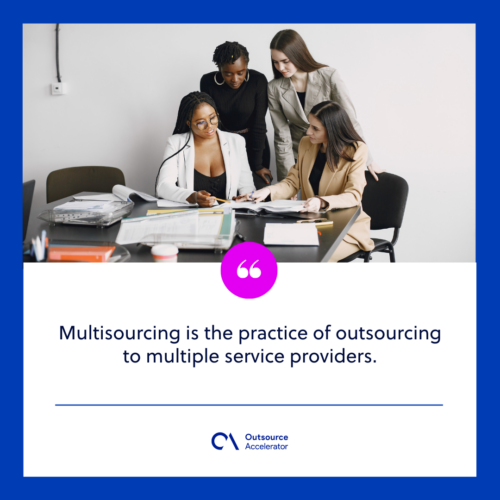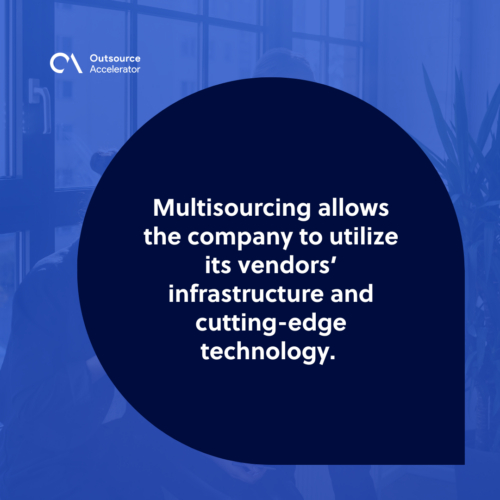What is multisourcing?

There has been a shift in outsourcing strategies. Today, many businesses question the value of single-sourcing in covering all their demands.
As a result, a growing number of firms are outsourcing a variety of operations to multiple service providers. This is called a multisourcing strategy.
In this guide, we’ll take an in-depth look at multisourcing and its pros and cons for businesses.
What does multisourcing mean?
Multisourcing is the practice of outsourcing to multiple service providers. It is a standard business method for dealing with rising business demands.
It differs from the traditional in-house service or single-source outsourcing.
In a multisourcing agreement, part of the company’s internal resources is also utilized to execute operations and technological infrastructure.

Importance of multisourcing
Multisourcing is vital for businesses that have a sudden high demand for their products. When the current vendors cannot supply all the demand, the company tends to find other vendors who can provide their needs.
In multisourcing, multiple suppliers can fulfill the clients’ demands by better understanding the businesses they support. It will significantly improve the efficiency of operations.
By implementing strong Supplier Lifecycle Management practices, organizations can enhance their supplier relationships, cut costs, and prevent operational disruptions.
This type of outsourcing can also help with business risk management strategies since it reduces the risk with their vendor. It also gives a competitive edge among service providers.
Advantages of multisourcing to businesses
Businesses may choose multi sourcing for a variety of reasons. Here are its advantages:
Reducing risk while improving the quality of service
Enterprise risk management strategies can benefit from multisourcing since it helps diversify the risk in vendor operations.
This strategy can foster competition among different outsourcing providers, reduce costs associated with recurring service contracts, and improve quality and collaboration across a group of providers.
Multisourcing in supplier management offers businesses various advantages.
By working with multiple suppliers, companies can reduce dependency on a single vendor, lowering the risk of supply chain disruptions.
Maintaining a competitive edge in the market
Multisourcing encourages competition between suppliers instead of relying on a single supplier to provide a wide range of services for a lengthy period.
You are using a multi-source method with a more extensive service scope.
As the most creative supplier receives more work, this competition can also contribute to more innovation.
Staffing flexibility
Multisourcing can fulfill the workforce you need without hiring and training a new employee. This will significantly save the company’s budget.
You can use multisourcing if you need extra workers. Whether it is for seasonal or cyclical activities, you can release them when no longer needed.
Flexible and scalable
Outsourcing to multiple vendors is not that hard. It can also be cheaper and less risky because there are no lock-in contracts when multisourcing between you and the providers.
In other cases, vendors allow customers to try out projects and services before agreeing to be partners.
Opportunity to focus on core operations
Like traditional outsourcing, multisourcing allows a company to focus on its core operations by distributing its other activities to its vendors.
It also helps the employees focus on their primary duties and achieve the company’s long-term goal.
Infrastructural and technological advancements
Multisourcing allows the company to utilize its vendors’ infrastructure and cutting-edge technology.
When a company outsources its business activities, it doesn’t need to invest in infrastructure because the contractor is responsible for developing it.

Drawbacks of multisourcing
Managing several vendors might also become complicated when using multisourcing
Here are the disadvantages of multiple outsourcing:
Difficulty in sharing information
Coordination between your company and your vendors relies heavily on the exchange of information. When you have numerous companies supplying your product or service, it’s necessary to manage and oversee them all.
The more suppliers you have, the more you need to focus on communication to avoid lapses. Partnerships must be maintained and continuously monitored to ensure the most significant results.
Possible increase in expenses
When suppliers are held accountable for their integration, it might lead to increased management expenses.
However, these costs may rise or decline depending on the complexity of the arrangements.
Poor customer service
Because of multisourcing, there is a possibility that some services, activities, or duties will be overlooked in a contractual agreement.
If you aren’t consistently offering your customers a satisfying experience, they won’t hesitate to shop elsewhere.
Quality assurance concerns
Many companies might give you a contract that looks like it will benefit you, but in the end, it will not. If your outsourced operations cannot adjust to improving technology, your product’s value might drastically reduce at the end of the outsourcing life cycle.
As long as your expenses are meeting the terms of the contract, you’ll have to pay for them.
Hidden costs
You need to be mindful of any hidden costs, whether outsourcing or multisourcing.
It is one of the most important disadvantages of outsourcing that companies must understand.
It’s essential to include all service information in an outsourcing contract. Any difficulties that may emerge not covered by the contract will be subject to additional charges.
Supplier Development
When multisourcing, challenges can arise due to managing multiple suppliers simultaneously, leading to communication breakdowns and coordination difficulties.
If a company relies too heavily on a single supplier, it may struggle to develop strong relationships with its other suppliers, hindering its ability to leverage the full potential of multisourcing.







 Independent
Independent




